Ukelele Ike
musician / 1920s


Cliff Edwards (June 14, 1895 – July 17, 1971), also known as "Ukelele Ike", was an American singer and voice actor
who enjoyed considerable popularity in the 1920s and early 1930s, specializing in jazzy renditions of pop standards
and novelty tunes. He had a number-one hit with "Singin' in the Rain" in 1929. He also did voices for animated cartoons
later in his career, and is best known as the voice of Jiminy Cricket in Walt Disney's Pinocchio (1940).
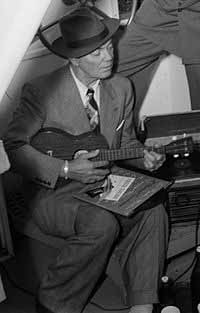
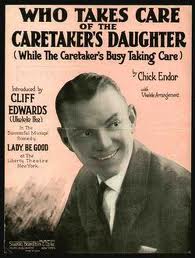
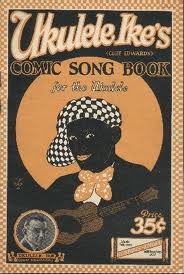
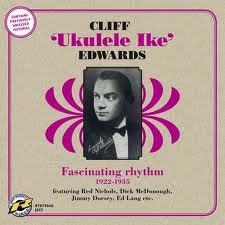
Edwards' continued to record until shortly before his 1971 death. His last record album, Ukulele Ike, was released
posthumously on the independent Glendale label. He reprised many of his 1920s hits, but his then failing health was
evident in the recordings.

Edwards was very friendly with MGM's comedy star Buster Keaton, who featured Edwards in three of his films. Keaton,
himself a former vaudevillian, enjoyed singing and would harmonize with Edwards between takes. One of these casual
jam sessions was captured on film, in Doughboys (1930), in which Buster and Cliff scat-sing their way through
"You Never Did That Before". Buster was battling a drinking problem at the time, and Cliff was nursing a drug habit,
both of which are evident in the finished film. In scenes when Keaton is sharp and alert, Edwards appears befuddled;
when Edwards regains his sobriety, Keaton is now stumbling and fumbling. (Edwards was ultimately replaced in the
Keaton films by Jimmy Durante.)
Edwards was also an occasional supporting player in feature films and short subjects at Warner Brothers and RKO Radio
Pictures. He played a wisecracking sidekick to western star George O'Brien, and filled in for Allen Jenkins as "Goldie"
opposite George Sanders in The Falcon Strikes Back. In a 1940 short, he led a cowboy chorus in Cliff Edwards
and His Buckaroos. Throughout the 1940s he appeared in a number of "B" westerns playing the comic, singing sidekick
to the hero, seven times with Charles Starrett and six with Tim Holt.
Edwards appeared in the darkly sardonic western comedy The Bad Man of Brimstone (1937), and he played the
character "Endicott" in the screwball comedy film His Girl Friday (1940). In 1939, he voiced the off-screen
dying Confederate soldier in Gone with the Wind in the makeshift hospital scene with Vivien Leigh and
Olivia De Havilland casting large shadows on a church wall.

In 1932, Edwards got his first national radio show on CBS Radio. He would continue hosting network radio shows on and off
through 1946. However, from the early 1930s, Edwards' popularity faded as public taste shifted to "sweeter" style
crooners like Russ Columbo, Rudy Vallee, and Bing Crosby.
Like many vaudeville stars, Edwards was an early arrival on television. For the 1949 season, Edwards starred in
"The Cliff Edwards Show", a three-days-a-week (Monday, Wednesday, and Friday evenings) TV variety show on CBS. In the 1950s
and early 1960s, he made a number of appearances on "The Mickey Mouse Club", in addition to reprising his Jiminy Cricket
voice for various Disney shorts and the Disney Christmas spectacular, "From All of Us to All of You".
Edwards was careless with the money he got in the boom years of the 1920s, always trying to sustain his expensive habits
and lifestyle. While he continued working during the Great Depression, he would never again enjoy his former prosperity.
Most of his income went to alimony for three former wives and for paying other debts. He declared bankruptcy four times
during the 1930s and early 1940s. Edwards married his first wife Gertrude Ryrholm in 1919 but they divorced in 1923.
He married his second wife Irene Wylie in 1923, and they divorced in 1931. In 1932, he married his third and final wife
actress Judith Barrett. They divorced in 1936.
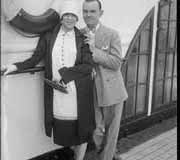
He had disappeared from the public eye at the time of his 1971 death as a charity patient at the Virgil Convalescent
Hospital in Hollywood, California. His body was initially unclaimed and donated to the University of California,
Los Angeles medical school. When Walt Disney Productions, which had been quietly paying many of his medical expenses,
found out about this, it offered to purchase the corpse and pay for the burial; but this was actually done by the
Actors' Fund of America (which had also aided Edwards) and the Motion Picture and Television Relief Fund. The Disney
company paid for his grave marker.
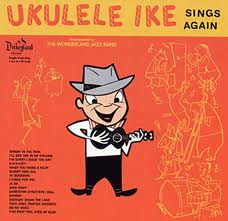
Partial filmography:
Marianne (1929)
The Hollywood Revue of 1929 (1929)
Doughboys (1930)
Montana Moon (1930)
Lord Byron of Broadway (1930)
Way Out West (1930)
Those Three French Girls (1930)
Good News (1930)
Dance, Fools, Dance (1931)
Parlor, Bedroom and Bath (1931)
Laughing Sinners (1931)
The Sin of Madelon Claudet (1931)
The Great Lover (1931)
Sidewalks of New York (1931)
Fast Life (1932)
Hell Divers (1932)
Red Salute (1935)
George White's 1935 Scandals (1935)
They Gave Him a Gun (1937)
The Bad Man of Brimstone (1937)
Saratoga (1937)
The Girl of the Golden West (1938)
Maisie (1939)
Gone with the Wind (1939)
Flowing Gold (1940)
His Girl Friday (1940)
Pinocchio (1940 - voice)
Power Dive (1941)
Dumbo (1941 - voice)
American Empire (1942)
Red River Robin Hood (1942)
Seven Miles from Alcatraz (1942)
The Falcon Strikes Back (1943)
The Man from Button Willow (1965 - voice)
References:
In an often used publicity still for Gone with the Wind, Edwards is visible in the shot.
In the final film, Edwards is off-camera.
2.Fanning, Jim, Walt Disney's Merriest Christmas TV Celebration, webpage found 2007-10-05 at
http://tvparty.com/xmas-disney.html.
Further readingThe Cliff Edwards Discography by Larry F. Kiner, Greenwood Press, New York, 1987. ISBN 0-313-25719-1
contains a short biography, an extensive discography, and listing of his film, radio, and television appearances.
External links Wikimedia Commons has media related to: Cliff Edwards
Biography:
Cliff Edwards at the Internet Movie Database
Cliff Edwards at the Internet Broadway Database
Cliff Edwards extensive fan site by David Garrick
Cliff Edwards "Ukulele Ike" on RedHotJazz.com, with .ram files of his vintage recordings.
"Cliff Edwards" (burial) Find a Grave.
(Retrieved August 28, 2010)